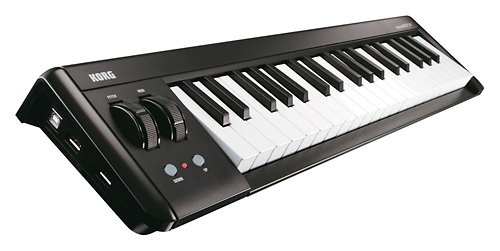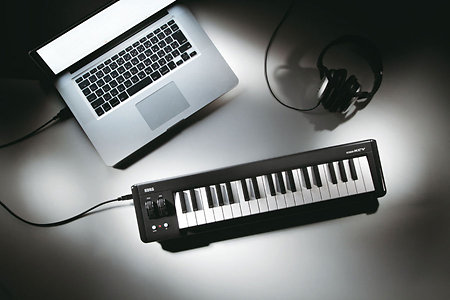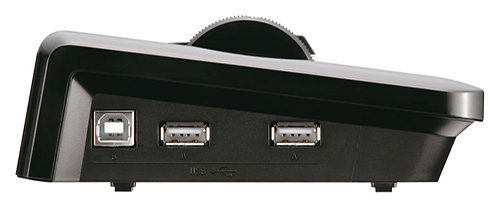Korg - microKEY 37
This product is no longer available for sale
These models in stock might interest you:
82,50 €
Warranty 3 years
Master Keyboard
MIDI Keyboard Controller / USB KORG microKEY 37, 37 true piano keys with Pitch Bend and Modulation.
ARTICLE N° 26738
Specifications
-
37 KORG microKEY
-
37 keys Master Keyboard
-
37 mini keys velocity sensitive
-
Functions pitch transposition and octave tonal full MIDI rank
-
Pitch Bend and Modulation Wheels
-
2 USB ports for adding, for example, or nanoKONTROL nanoPAD
-
Comes with software Korg M1 LE, Lizzard Lounge Session Toontrack EZ Drummer Lite and included
-
USB cable and manual included
-
Dimensions: 565 x 139 x 54 mm
-
Weight: 1 kg
Presentation
The Korg MicroKey has 37 velocity-sensitive keys and installing the same technology used for the Natural Touch XL microKorg synthesizer workstation and MicroStation. The keys have been adjusted for optimal playability, including chords, glissandos, and rapid phrases.
To go further...
It all starts with the encounter of Tsutomu Kato, nightclub owner, and Tadashi Osanai, a graduate of the University of Tokyo and seasoned accordionist. When Osanai occurred in Kato box, he was accompanied by a drum machine Wurlitzer Sideman he was not totally satisfied. Confident of making a better product, he convinced Kato to finance his project. Korg and was founded in 1962. At the time, the company was called Keio Electronic Laboratories because its offices were close to the Keio train line in Tokyo.
Korg's first product was marketed in 1963. He was an electromechanical drum machine called Donca-Matic DA-20. Following its success, Keio realized in a digital version in 1966: the Donca-matic DE-20.
In 1967, Kato was approached by Fumio Mieda, an engineer who wanted to build keyboards. Faced Mieda enthusiasm, Kato asked him a prototype and 18 months later, Mieda presented him an organ. The fifty copies produced were the first to make the score Korg.
Organs Korg were successful until the early 1970s but faced with competition from big manufacturers, Kato decided to turn to the emerging market of synthesizers. The first model was the Mini-Korg, in 1973.
Korg produced other synthesizers in the 1970s and 80s In 1989, shortly before the release of M1, Yamaha took control of the company. This acquisition was made in good conditions and both brands continued to coexist and compete on the market.
In 1992, Korg has redeemed Vox.
In 1993 after successful years, Tsutomu Kato announced that it repurchased the shares that Yamaha had in society; Korg is now a fully independent company.
Since the activities are diversifying as digital effects, records equipment, electronic percussion, tuners and virtual instruments.
Korg is also a distributor of Marshall.
Korg's first product was marketed in 1963. He was an electromechanical drum machine called Donca-Matic DA-20. Following its success, Keio realized in a digital version in 1966: the Donca-matic DE-20.
In 1967, Kato was approached by Fumio Mieda, an engineer who wanted to build keyboards. Faced Mieda enthusiasm, Kato asked him a prototype and 18 months later, Mieda presented him an organ. The fifty copies produced were the first to make the score Korg.
Organs Korg were successful until the early 1970s but faced with competition from big manufacturers, Kato decided to turn to the emerging market of synthesizers. The first model was the Mini-Korg, in 1973.
Korg produced other synthesizers in the 1970s and 80s In 1989, shortly before the release of M1, Yamaha took control of the company. This acquisition was made in good conditions and both brands continued to coexist and compete on the market.
In 1992, Korg has redeemed Vox.
In 1993 after successful years, Tsutomu Kato announced that it repurchased the shares that Yamaha had in society; Korg is now a fully independent company.
Since the activities are diversifying as digital effects, records equipment, electronic percussion, tuners and virtual instruments.
Korg is also a distributor of Marshall.
Korg - microKEY 37
Korg - microKEY 37
82,50 €
Warranty 3 years
Spotlight on
Founded in the early 1960s by Tsutomu Katoh and Tadashi Osanai, Korg is a brand with a strong spirit of innovation, combined with a high level of quality. Over the years, Korg has continued to expand its business, and today offers an incredible assortment of products for musicians of all backgrounds, and DJs with their mixers, samplers and grooveboxes.
Today, Korg's most popular instruments include the Minilogue XD, Wavestate and Opsix, its B2, PA700 and SV-2 keyboards as well as the entire series of Volca modules.












